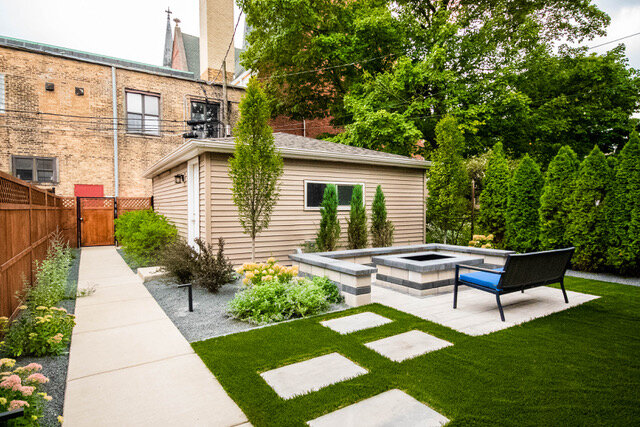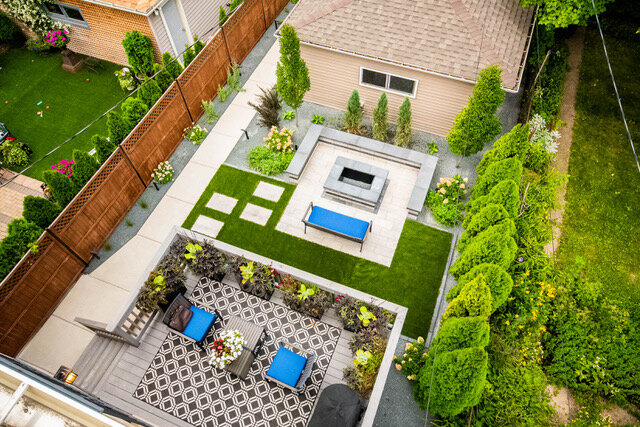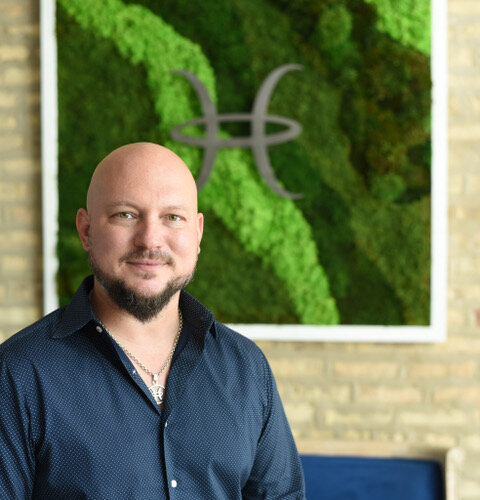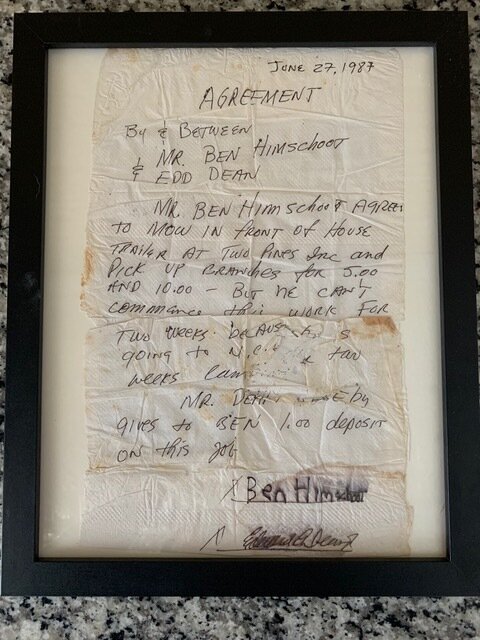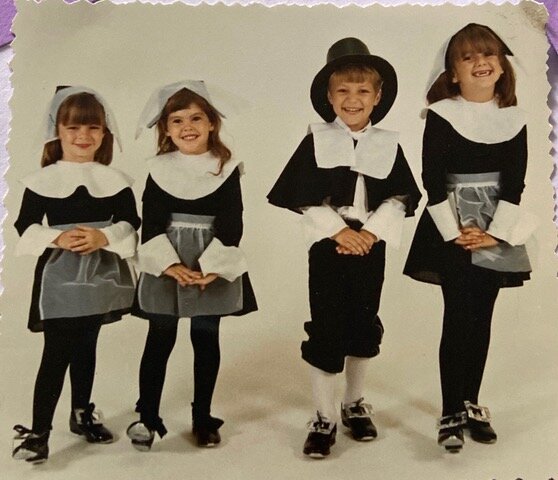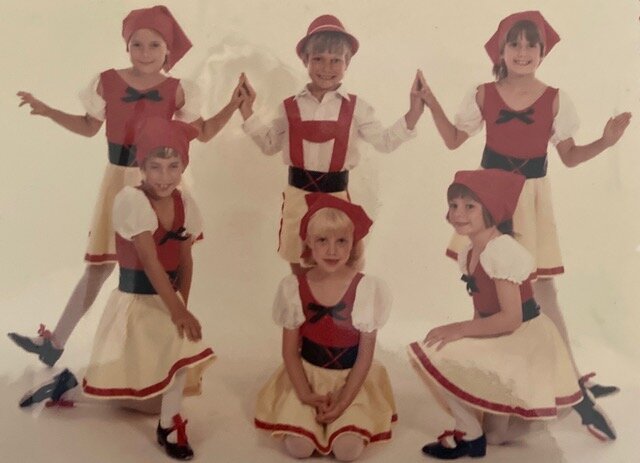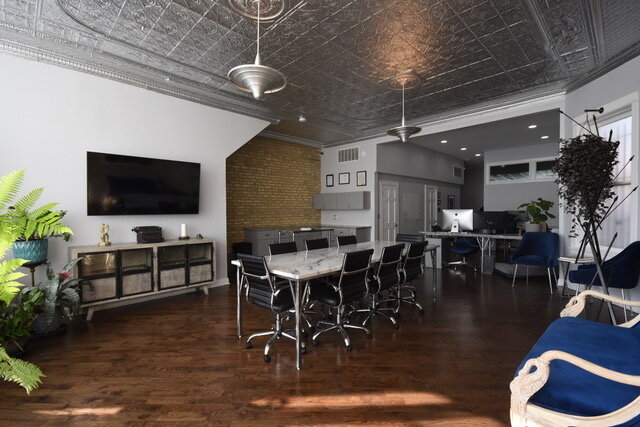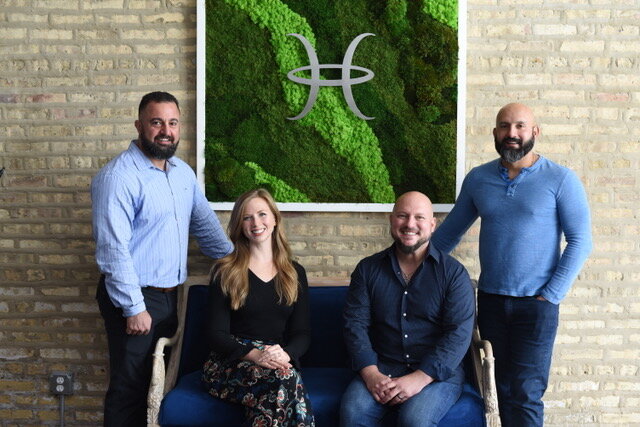TRANSCRIPT
Ricky McEachern (00:02): Ben has been a creative spirit from an early age. And in speaking with him, I found that his creative journey is very similar to mine. I am happy to share my conversation with landscape architect and founder of hymns Ben design studio, Ben.
Ben HImschoot (00:40): Sure. So welcome to the Hinzman design studio. This is for our primary business, which is landscape architecture, design built, and we are now venturing into interior design as well. So I have a team now that's, we're collaborating both of us have also an interior designer and now landscape designer working for me full time. So we're looking to be able to work with clients across a range of project types. So does that mean that the, those two parts work together like interior and exterior? Ideally we'd, we'd be able to work with clients both on the inside and outside where it could be, you know, one or the other. New Speaker (01:16): Tell about one Oh one on landscape design, you know, in a couple sentences what it's all about. Okay. So landscape architecture is what, mfficially, I guess is the title.
Ben HImschoot (01:27): Landscape architecture is about designing the living in built environment outside of buildings. So here in Chicago, in the city, it could be a roof deck. It could be on top of the building. It could be an exterior park or it could be someone's backyard or private garden space. So we work to really design and transform those spaces that are meaningful and to our clients and they have the right program, they have the right elements. And because they're living things landscape design is interesting that, you know, what you design and install on day one is going to be something different in five, 10 or 20 years as the plant materials develop. And it goes, you know, ages over time. So
Ricky McEachern (02:07): It sounds like this is more than just plants though. It sounds like there's other elements that you are pulling
Ben HImschoot (02:13): Together. Yes. So what we do what's known as hardscape design, which is if you can imagine things that are hard outside, so that could be walkways, it could be garden benches or seat walls, retaining walls pergolas, outdoor kitchens fire elements. I mean, there's a range of different things that we use in our designs to create these spaces. Yeah. Okay. That sounds, that sounds amazing. Because you are potentially built, you know, transforming the way people live potentially. That's the idea. Yeah, that's great. So how did you get into that? Cause I know that,
Ricky McEachern (02:55): I know that we did have a pre-conversation and you have a background that is not in that.
Ben HImschoot (03:04): That is very true. So the, the long arc of my journey to becoming a landscape architect started growing up in actually in the construction trade, if you will. My father had an excavating company down in Southwest Florida. And so I grew up with a shovel in my hand, as I like to say, I'm working, doing manual labor. And after the, over the years of sweating and toiling, I swore I was never going to do that for a living. So my plan to escape that was actually to get a degree in business. So I left home at the tender age of 17 to go to college full time got my degree in international business that I was going to travel the world.
Ricky McEachern (03:43): Okay. But you're so, but your interest in getting a degree in business was that because you were interested in business or you are interested in doing something other than manual
Ben HImschoot (03:55): Something other than manual labor. And I saw that as my ticket to kind of escaping the small little Island community where I grew up. So that was the main motivating factor at the time.
Ricky McEachern (04:05): Okay. And so your intention, once you got into international business and then it's, you know, being a global executive travel
Ben HImschoot (04:13): Around the world and deals and just living the good life is, was my thought. And fast forward a few years, I I got my degree. My first job out of college was in Miami and working in logistics and freight forwarding and in a windowless warehouse where I worked 60, 70 hour work weeks and hated my life, hated my job, hated everything about it. So I did that for about two years. And so this is, this is nuts. I, and my father at the time needed help with his construction business, which was growing. So I ended up moving back to the area that I swore I would get away from and working with my father's company, helping him run his construction company. So in the process of doing that, he suggested that I start a landscape division because we were already had an active set of clients who were working.
Ben HImschoot (05:05): We were doing the excavating and land moving work. And then once that I realized I had that opportunity. I started doing some cutting grass and taking on some, some landscape projects. So this was really not my idea, wasn't my intention. But very quickly I realized I had a love for the plants and especially for design. And that's the area that I realized I didn't have the skills and experience in. And so I went back and got my master's degree in landscape architecture because of this whole experience on winded explanation of how I got into landscape design and landscape architecture,
Ricky McEachern (05:40): This whole creative, the whole creative aspect of it that you went to school for. I assume that that is not the first time that you had been excited about creative ideas.
Ben HImschoot (05:54): I was exposed to the arts at a young age. Mother actually had a dance studio. She was a ballerina and taught dance for, she had a studio for 50 years. So I actually grew up learning various dance style. So tap and ballet and jazz and all that. And she would bring,
Ricky McEachern (06:13): Bring you to work, or should we teach you at home
Ben HImschoot (06:16): In her classes? She made sure I was, I learned all these different styles of dance. And then of course having a heroine designer on a ballet studio, it was twice a year, we'd have the Christmas recital and then the end of year recital in June which was always a big production. So I was always running around helping make the sets and painting the scenery. And, you know, sometimes if I wasn't in the production, you know, dancing, I was kind of behind the scenes helping you know, opening the curtains and doing the special effects and that kind of thing. So why didn't you feel
Ricky McEachern (06:47): To do something like that for a career as opposed to, is that something you even considered?
Ben HImschoot (06:55): I think by the time I was 14 or 15, I was really, I saw like being a dancer or being in that whole thing. It was always an embarrassment to me because I was still struggling with coming out as a gay man. So I was very closeted. So to me that was just never really an option, I think to be part of that whole world. So your story
Ricky McEachern (07:14): Is so similar to mine. And yeah, so not to get into too much about me, but basically I was a very creative kid. And then at some point probably around,
Ben HImschoot (07:26): I don't know, nine or 10, I started to get picked on a little bit, not a lot, but a little bit. And I was like, yeah, I'm not going to be, I'm not going to be the artsy kid anymore. And I ended up falling in love with science and I went to school for engineering. Wow. And it wasn't that I re I didn't want to be an engineer, but I knew that it was guaranteed a risk, low risk way to make money right. Out of college, same exact thing. And then I did it and I didn't like it and I ended up doing something else. But yeah, it sounds like a very similar, because now I'm an artist, it sounds like a very similar journey. Yeah. That's, that's fantastic. Yeah, I think also I do appreciate that my mother like she made sure that I attend art classes growing up.
Ben HImschoot (08:08): So I took painting and drawing and sculpting. And I wish I always loved, you know, to have that kind of freedom outlet. But again, I just never really knew how to kind of connect those things in a way that would, you know, what I thought would create a successful career for myself. So and so I, and then I started my own business. So I was in Florida and I was working and had my own kind of design build studio there before coming to Chicago. When my husband got the opportunity for us to move here seven years ago. So you've been here seven years, seven years now. Yeah. And how
Ricky McEachern (08:42): You like the weather as it relates to plants and opportunities for like what you can select, you know, and all that, that whole, yeah.
Ben HImschoot (08:56): So really the biggest difference between Florida and here is we have seasons here. We have four of them. It's, it's, it's pretty incredible. So there's a much more difference in the material that, you know, remains green throughout the year versus the perennial plants that drop their leaves. So they go dormant and they come back. I actually really enjoy having this variety of plant materials to work with. On the outside I had to relearn, you know, all the plants that ruined this in this climate, but I love that there is a succession of seasons and that also influences my design and landscape because you have to also plan for the four seasons of what's gonna look good compositionally. Yeah. That sounds like that would be a big adjustment. Yeah, it is. It is. But I think the basic core concepts of designing is, is kind of the same. You have you know, you have color, you have textures, you have layers. You know, you have to kind of think in three dimensions a little bit. But it's, it's a fun challenge. I really enjoy that. I'm curious,
Ricky McEachern (09:57): It's about learning dance at a young age like that. Cause I, I don't know anything about, you know, I've never been a trained dancer or anything like that, although I was a gymnast,
Ben HImschoot (10:07): But is, is that a creative exercise learning?
Ricky McEachern (10:16): Would you consider that affected the creative part of your brain?
Ben HImschoot (10:20): It definitely teaches you rhythm balance, cadence, melody, you know, in movement. I think it also kind of helps your brand and your body kind of connect in those ways. So I think there's a creative aspect to it. When you're learning choreographed dance, you're kind of learning someone else's creation. I I had gone back and tried to take some dance classes as an adult and have failed horribly at it because for some reason I can't seem to follow choreography. It just doesn't stick in my brain very easily. But I do love to get on the dance floor and just kind of let loose and have, you know, let that be my own creation. So it's interesting that, you know, I, I kind of started in one regimen of dance and now as an adult, I've kind of find myself in a very different space brain-wise as it relates to dance,
Ricky McEachern (11:10): I like to know what your ideal client would be or ideal project.
Ben HImschoot (11:14): It would be ideal projects and clients like fantasy project, fantasy projects. I've been really, really blessed with, I think my own design studio that most of the clients I've had the pleasure of working with have been delightful. Obviously a client that has no set budget would be, is always a delightful, you know, objective one that has a variety of spaces and interests that allow us to just really let me do my job as creative. Would it be, would it be a a residence? It could be a residence, it could be a commercial projects. I, and I could most with, with residential clients, it's so much more a personal experience when you're designing a space that someone lives in versus a public space. So I would say, yeah, a dream project or client would be a client with a multi acre estate and lots of wishlist items and the unlimited budget and lots of space for me to kind of go do a hog wild.
Ricky McEachern (12:17): So it was an outdoor kitchen part of what you would design
Ben HImschoot (12:20): Absolutely, absolutely. Going into construction in the coming weeks. So we do outdoor kitchens pergolas, fire pits, outdoor lighting systems. So really it's, it's whatever you want to create. So yeah, that's the fun part.
Ricky McEachern (12:38): Yeah. An outdoor kitchen is when I go on vacation to like Mexico or something, my, you know, my friends and I rent a house and outdoor kitchens are always part of what we get, but obviously I don't have one living here in Andersonville Ben HImschoot (12:54): In Chicago. Yeah. Or at least not yet. I do have some clients here in the city that have outdoor kitchens on their roof to terrorism decks here as well. So that's those are always fun.
Ricky McEachern (13:06): So what do you want people listening to this? What, what do you want them to know about what you have to offer?
Ben HImschoot (13:12): That's a wonderful question. I'm first of all, thank you again so much for having me on your show. This is a delightful I would just want people to know that, you know, we are here to serve our clients to build relationships, to help them transform their living spaces, both inside and outside. And we now have this lovely design studio that you see behind us as a resource. We've got an excellent rowing team that I'm really proud of and excited to be working with. I would love to have the opportunity to engage with anyone who's interested in, in our services.
Ricky McEachern (13:49): And I'm not sure if this was included the location of your design studio. I know we talked about it, but I think that was before we started recording the location of the design studio is where
Ben HImschoot (13:59): You're an Edgewater. And the actual address is 61 36 North Clark street here in Edgewater, just South of Grandville. So we're pretty centrally located to the North side of Chicago. And I'd say about 90% of our projects are within a 10 or 15 minute radius of us. So we can hop on the expressway and be downtown in 15 minutes or up to the more shore equally as quickly. So,
Ricky McEachern (14:21): Okay. And you know, people that are listening to this that are maybe in a situation where they are not using their creativity, as you know, you were at one point and you made some changes so that you could do that. Do you have any suggestions to people that are watching this, that maybe are not living as much of a creative life as they wish they could and anything they could do to make a shift? Absolutely.
Ben HImschoot (14:52): So my first piece of advice is that life is way too short to not love what you do. And no salary or position or title is ever going to make you happy if you're denying yourself the creative experience, if that's your passion. So I would encourage anyone that finding themselves stuck or finding themselves, not feeling like they're fully realizing their creative outlet to look for a change and, and go for it and really put your, put your passion where you put your life, your passion into your life and pursue your dreams. And I, and I, I mean, that's that old adage, it sounds silly, but like follow your passion and the money will follow is that I've heard people say that. I think it's, it can be true. I mean, you have to put in the work, it's not easy. It doesn't just fall into your lap. But you know, I think if you really apply yourself and can tap into your creative energy, I think it can be very rewarding. So yeah,
Ricky McEachern (15:49): The last person that I was that I had on the podcast, Chuck, he said that exact same thing, you know, follow your passion and the money will follow. I'm not a hundred percent sold on that.
Ben HImschoot (16:04): But I think that the hard work part is, you know, is, is a big component.
Ricky McEachern (16:12): You know, working hard at whatever you do. And I think that you'd be, you're going to be at least yet
Ben HImschoot (16:18): Results. Yeah.
Ricky McEachern (16:20): You're at least find out that it's not going to work
Ben HImschoot (16:23): Quicker. The more harder you work and the more you're putting out
Ricky McEachern (16:28): And engaging with the world, you're going to get more results. And if you're getting the wrong results, you're going to know quicker, the harder you work, you know? Right.
Ben HImschoot (16:35): I mean, and I guess kind of to that point, when I look back at like kind of my arc of like going from doing something I hated. And then, I mean, when I think of like, when I actually started my, like the landscape offshoot of my father's business, you know, all those years ago, I mean, this was in the early two thousands. So this was, yeah. So we're talking 16 years ago that I kind of made that segue, but then I had that first business and I learned a lot and I made some mistakes, you know, and then right after grad school, I had my own business in Florida and that was growing, but I was also learning a lot. So this is actually my third time and having this design studio being self employed of really going for it. And now it's feeling like it's all kind of come together, but it's also been 16 years of me really pursuing this dream and really working in this direction. So it doesn't happen overnight. But I think definitely when you say that it's all coming together, what
Ricky McEachern (17:27): It's happening now that had not been happening over the past
Ben HImschoot (17:30): 16 years? Well, for me, I mean just this physical design studio space has been a dream of mine for a very, very long time. So to finally have achieved that and now have an actual physical space, as opposed to for this, I was working out of my home for all those years. So to actually have an actual design studio, to have a space, to be, to pour my energy into and, and be able to gather and bring my clients that for me is just like one of the most incredible things that's happened to me recently. So that's very exciting. That's great. Growing and blossoming and flourishing these last few years has really been exciting to see as well. So the fact that I've been able to add other people to my team as well and not just being kind of a one man show has been also really, really powerful for me as well.
Ricky McEachern (18:16): How is it working with the business aspect of running a business and all of the annoying things that you have to deal with with that and the creative stuff. You,
Ben HImschoot (18:28): We have to switch hats and kind of be able to work both sides of that equation. Again, like I said, being in self-employed previously had really helped me learn a lot of those lessons of how to manage and run a, run a small business. And I guess the fact that I did go to business school was also a good platform for me to have that underlying core training, but to be fair, they don't always teach you how to run a business in business school either. So a lot of it's trial by error and seeing how other people succeed or not succeed and learning from your mistakes and others, and kind of figuring out what works. No. Did your dad run his own business
Ricky McEachern (19:07): And did your mom run her own business and as well see that's really important that that was something that you were exposed to early on that mindset.
Ben HImschoot (19:19): Yeah. I definitely come from an entrepreneurial family, so that was kind of in my ingrained in my psyche, so to speak. Yeah. my actually my sister found digging through some old records. My first landscape contract from 1987, that was drawn on a napkin from when I was six years old, that my father had, you know, done this thing where I was going to go mow this guy's yard and pick up the, the tree limbs. And it's actually all written out as a, as a, as a contract on a napkin that she's saved. And I actually have it framed here in the med design studio. So I guess if you look back at the whole arc of things, it's kind of interesting that, you know, that was imprinted on me in a very young age.
Ricky McEachern (20:02): Yeah, I think that kind of stuff is really important. I think that even if your parents aren't explicitly, you know, talking about or teaching about being an entrepreneur, you're simply you're being exposed to the dynamic and their view on the world. And I think that obviously, you know, how you're raised and your parents' viewpoint on the world is going to affect you. Now, I know that you have like me, you're the youngest
Ben HImschoot (20:28): Older sisters are they entrepreneurs as well? To some extent, yes. A couple of them are, they have their own businesses as well. So yeah, but it's interesting. I being the youngest of four too, I think I also had the advantage of kind of seeing how the other ones grew up and then saying, Oh, you know, this worked and this didn't work and then kind of finding my own path forward. So, you know,
Ricky McEachern (20:54): I can definitely relate to that. How much older are your sisters?
Ben HImschoot (20:58): A pretty good age gap. So the oldest is 12 years older. Second oldest is 11 and then the youngest is eight years older than me.
Ricky McEachern (21:04): So mine are 12, 10, seven and five years.
Ben HImschoot (21:08): Okay. Very similar.
Ricky McEachern (21:09): Yeah. So it's very, very similar. And I was I did something like that where I was always look, you know, I was always interested in being successful and you know, my future and I was always looking at what they were doing and what was working and what wasn't working and, you know, paying attention to their successes and failures. And I'm trying to, so that was helpful.
Ben HImschoot (21:38): It is, isn't it,
Ricky McEachern (21:41): One of the benefits of being an artist and a creative person like yourself, where you envisioned something and then you manifest it in the world and people experience it, that's an amazing experience. And yours is different because people are living in what you create. So tell me about that experience and I'm sure that's something that you wouldn't be able to get no matter how successful you were in internet.
Ben HImschoot (22:13): Yeah. I would say absolutely. That is a kind of almost a magical quality of what we're able to do as creatives and as a landscape designer and landscape architect. Especially when I'm working with residential clients, I immediately always look for that connection with them, try to understand them, understand their mood, their, how they live, how they experience, how they want to experience the space. And I really try to connect with them on a really deep level, almost a psychic level, if you will. So that I can kind of channel what I envision them needing and wanting and their lifestyle and how they're gonna almost envision how they're gonna use the space as I'm designing it. And some of the most rewarding moments that I've had is when you do the final walkthrough with the client, I mean, there's often tears that like, I'll be crying, there'll be crying just from the sheer joy of knowing, like when I've nailed a design. And then we walked through that space and it's, I know it's something they're going to live in and enjoy and use for years to come. That's like probably one of the most rewarding things about my job. And I think that's what really addicted me to being a designer. You know, it's just create something that, and it's not about my ego. It's just more about like, Oh my gosh, I get to make this space that's, that's meaningful. And that has impact on people's lives. That to me is, is powerful. So yeah.
Ricky McEachern (23:28): Yeah. That's a challenge for, you have to have a way of connecting with people and understanding people and being a good, it's not even just listening like that is you have to have a sense, Oh, you have to have a special type of antenna to connect people in a way that you can create something that's going to make them cry. Like, is it just conversation or how do you get to know
Ben HImschoot (23:52): So that you can know enough about them? I mean, it all starts with the initial even phone call or connection. A lot of times I'll know almost immediately if I'm screening any company lead or a potential client sometimes I'll know within like minutes, if like, I know this is going to be like an ideal client for us, or like not a good fit and which case I've been blessed that I'm able to be like, turn down a few opportunities, just cause I didn't, I knew in my gut that this just is not going to be the best fit. Cause you know, I'm not everyone's cup of tea and vice versa. So I don't know, maybe I'm not trying to say I have special powers or senses, but there's just something intuitive that I know through my conversations with people and getting to know them a little bit. And during those initial consultations that I can usually tell like, Hey, this is definitely how I want to connect. Or, and sometimes it's more challenging than others. Of course some clients really are, you know, a little scared along the way. So you often play a counselor or you know, kind of guide them through the whole process as well. So that's actually a part of it as well. So building that connection with your clients is so important to what we do. Yeah.
Ricky McEachern (25:01): You say that you do have special powers. I mean, a is a special power. Not anyone can do that and that's why people are paying you. So I would definitely say you have a special power, Ben HImschoot (25:12): Very blessed and very humbled to be able to do what I do. I get to create and design and, you know, have these exciting moments, you know?
Ricky McEachern (25:22): Well, I'm very, very happy for you. I'm always happy when people Ben HImschoot (25:25): Are able to
Ricky McEachern (25:28): Have a creative experience in their lives like that, you know there's many people that wish they could and they don't. And you know, I know I'm very grateful that I get to have that experience and I'm extremely happy for you that, you know, you get to, and also your new studio and
Ben HImschoot (25:48): Sounds like you're some of your dreams are coming true and that's, that's wonderful.
Ricky McEachern (25:54): So if people want to connect with you to find out if you guys are a good fit to work together for interiors or exteriors, what do they need?
Ben HImschoot (26:04): Right. Social media. So you can check us out on Facebook or on Instagram. Our website's a great place to start looking at our portfolio and seeing it for our design style and aesthetic is something that excites you. Or you can always pick up the phone and give us a call. Our phone number is (312) 725-4417 or our internet website is www dot hymns. Ben designed.com and look forward to hearing from you, let's say, and our Instagram is at H D S underscore Chicago.
Ricky McEachern (26:41): All right. Well thank you much for for connecting with me. I know that you know, you and I have, I've had you at my house. I have these, I can't do them now because of COVID, but being new to Chicago and I'm always trying to connect with new people and connect with other creatives. I was having these regular parties where all of the artists that I met, I would just invite them over and make food. And I know that you came to a couple of them. It was amazing. And I miss that. So I look forward to the day in time we connected in that way. Yeah. Yeah, definitely. All right. Well, thank you. Thank you. I really appreciate you. .


